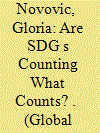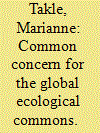| Srl | Item |
| 1 |
ID:
184658


|
|
|
|
|
| Summary/Abstract |
The 2030 Agenda for Sustainable Development (Agenda 2030) encompasses social, economic, and environmental commitments within a single global framework. However, experts have been warning that the ambitious nature of Agenda 2030’s Sustainable Development Goals (SDG s) might be lost in indicator-driven implementation. This article examines the assumption that SDG indicators result in policy shrinking (offering a less ambitious framing) by exploring how the framing of Agenda 2030’s gender commitments shifts from SDG s to their indicators. Employing critical frame analysis, this article shows that SDG global indicators result in policy shrinking of gender-specific targets in terms of their 1) human rights framing 2) overall scope, and 3) inclusivity of target groups. This policy shrinking does not necessarily undermine Agenda 2030, but it does call for greater attention, especially by actors promoting gender equality, to national interpretations of specific SDG targets and the inclusivity of otherwise marginalized policy target groups.
|
|
|
|
|
|
|
|
|
|
|
|
|
|
|
|
| 2 |
ID:
181168


|
|
|
|
|
| Summary/Abstract |
This article elaborates on ideas concerning future generations and whether they are useful in understanding some aspects of the concern for the global ecological commons. The article’s main scholarly contribution is to develop analytical tools for examining what a concern for future generations would require of current generations. It combines the scholarly literature on future generations with that of solidarity. The ideas concerning future generations are interpreted in terms of an ideal typical concept of solidarity with future generations. This concept is divided into four dimensions: the foundation of solidarity, the objective of solidarity, the boundaries of solidarity and the collective orientation. By applying these four dimensions in the context of the political process leading to Agenda 2030, the potentials and limitations of the concept are evident. The article concludes that the absence of reciprocity between current and future generations and uncertainty about the future are both crucial issues, which cut across the four dimensions. We cannot expect anything from people who have not yet been born, and we do not know what preferences they will have. This shows the vulnerability of forward-looking appeals to solidarity with future generations. Nevertheless, such appeals to solidarity may give global political processes a normative content and direction and can thereby contribute to understanding common concerns for the global ecological commons.
|
|
|
|
|
|
|
|
|
|
|
|
|
|
|
|
| 3 |
ID:
188468


|
|
|
|
|
| Summary/Abstract |
TWO ANNIVERSARIES in 2022 received little attention because of global turbulence but symbolized events whose significance is hard to overestimate. They were two interrelated forums - the United Nations Conference on the Human Environment in Stockholm (June 5-16, 1972), also known as the Stockholm Conference, and the UN Conference on Environment and Development (UNCED) in Rio de Janeiro (June 3-14, 1992), informally called the Earth Summit. These two conferences laid the basis for the concept of sustainable development and the process of implementing it.
|
|
|
|
|
|
|
|
|
|
|
|
|
|
|
|